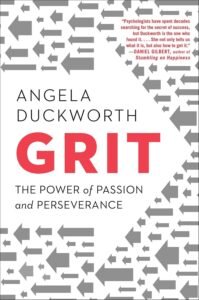
Look, I get it. You’ve probably read enough self-help books to wallpaper your bedroom (and maybe your neighbor’s too). But before you roll your eyes so hard they get stuck that way, hear me out. Angela Duckworth’s “Grit: The Power of Passion and Perseverance” isn’t just another motivational book telling you to believe in yourself and chase rainbows. It’s more like that brutally honest friend who loves you enough to tell you that success isn’t about talent – it’s about being too stubborn to quit.
TL;DR (Because I Know You’re Already Thinking About Scrolling)
- Grit = Passion + Perseverance (Not your grandmother’s definition of just “toughing it out”)
- Talent is overrated (Sorry, child prodigies)
- Success is more marathon than sprint (And yes, both are equally painful)
- You can develop grit (Like a muscle, minus the gym selfies)
- Practice makes perfect… if you do it right (There’s actually a science to this stuff)
Why You Should Care (And Why I’m Not Just Writing This for SEO)
Let’s be real – you’re probably reading this because:
- You’re procrastinating on something important
- You’re wondering why that seemingly less-talented colleague got promoted
- You’re genuinely interested in self-improvement (Look at you, you magnificent unicorn)
Whatever your reason, stick around. This might just be the perspective shift you need to stop being the person who has “great potential” and start being the person who actually does something with it.
The Grit Definition (No, Not the Stuff in Your Sandwich)

Duckworth defines grit as “passion and perseverance for long-term goals.” Think of it as the difference between being the person who says they’re writing a novel and the person who actually writes one, even if it means sacrificing their Netflix time (the horror!).
The Four Ingredients of Grit (Like a Recipe, But You Can’t Eat It)
- Interest (Finding your thing)
- Practice (Getting embarrassingly bad at your thing before getting good)
- Purpose (Believing your thing matters)
- Hope (Knowing you can improve, even when everything suggests otherwise)
The Talent Myth: Why Being “Naturally Gifted” Is The Most Overrated Thing Since Crystal Pepsi
Here’s where Duckworth drops the mic: talent isn’t everything. In fact, she argues it’s not even the main thing. This is where all the “naturally gifted” people start sweating nervously.
The Math That Will Make You Feel Better About Your Average Self
Talent × Effort = Skill Skill × Effort = Achievement
Notice how effort counts twice? That’s not a typo. It’s science’s way of saying “showing up matters more than showing off.”
The Deliberate Practice Playbook (Warning: May Cause Actual Growth)
Remember when your piano teacher told you practice makes perfect? They were lying. Only deliberate practice makes perfect. Here’s the breakdown:
What Deliberate Practice Actually Looks Like:
- Set specific goals (Not “get better at stuff”)
- Focus intensely (Sorry, no multitasking with TikTok)
- Get immediate feedback (Sometimes painful, always necessary)
- Refine and repeat (Like groundhog day, but productive)
The Growth Mindset Connection (Plot Twist: You’re Not Fixed)
Duckworth’s work aligns perfectly with Carol Dweck’s growth mindset theory, but with more emphasis on long-term commitment. It’s like a growth mindset that went to the gym and got buff.
How to Develop Grit (Without Moving to the Desert to Find Yourself)
- Develop a Fascination
- Follow your interests (But give them time to develop)
- Explore deeply (Wikipedia rabbit holes count)
- Get curious about everything (Yes, even Excel spreadsheets)
- Daily Deliberate Practice
- Start small (Like, really small)
- Focus on weakness (Your comfort zone is not your friend)
- Embrace the suck (It’s temporary… mostly)
- Connect to a Higher Purpose
- Find your “why” (Beyond “because I want to be rich”)
- Make it about others (Selfishness is so 2019)
- Think long-term (Your future self will thank you)
- Cultivate Hope
- Learn from failures (They’re just spicy learning opportunities)
- Focus on progress (No matter how microscopic)
- Surround yourself with gritty people (Grittiness is contagious)
The Parent’s Guide to Raising Gritty Kids (Without Becoming a Tiger Parent)

If you’re a parent, this section is for you. If you’re not, read it anyway – you might need to raise a gritty houseplant someday.
The “Hard Thing Rule” (Not as Scary as It Sounds)
- Everyone has to do something hard
- You can quit, but only at natural stopping points
- You get to pick your hard thing
- Stick with it for at least one season
The Dark Side of Grit (Because Everything Has a Downside, Even Chocolate)
Let’s address the elephant in the room: Can you have too much grit? Short answer: Yes. Long answer: Yeeeeeeeeeees.
When Grit Goes Wrong:
- Pursuing the wrong goals (Stubbornness ≠ Grit)
- Ignoring better opportunities (Sometimes quitting is smart)
- Burning out (Being gritty doesn’t mean being stupid)
Real-World Grit: Case Studies That Will Make You Feel Lazy
The Seattle Seahawks
Pete Carroll implemented grit-based principles and won a Super Bowl. Meanwhile, I can barely implement a consistent coffee routine.
The West Point Story
Duckworth studied West Point cadets and found that grit predicted success better than any other measure. Yes, even better than how many push-ups they could do.
How to Actually Use This Information (Because Knowledge Without Action Is Just Trivia)
Your 30-Day Grit Challenge:
- Week 1: Interest Exploration
- Try something new every day
- Document what excites you
- No, scrolling Instagram doesn’t count
- Week 2: Deliberate Practice
- Pick one skill to focus on
- Practice with purpose
- Track your progress (The good, the bad, the ugly)
- Week 3: Purpose Finding
- Connect your goals to bigger impact
- Write your personal mission statement
- Try not to make it sound like a corporate website
- Week 4: Hope Building
- Celebrate small wins
- Learn from setbacks
- Build your grit support network
The Bottom Line (Because All Good Things Must End)
Grit isn’t just another buzzword to add to your LinkedIn profile. It’s the scientific explanation for why some people succeed while others just talk about succeeding. It’s the difference between being the person who says “someday” and the person who says “today.”
Your Next Steps (Because You’ve Read This Far, Might as Well Do Something)
- Pick your “hard thing”
- Schedule your deliberate practice
- Find your grit accountability partner
- Start before you’re ready (Which is now)
Remember, developing grit is like growing a garden – it takes time, consistency, and occasionally getting your hands dirty. But unlike gardening, you can’t kill it by forgetting to water it for a week.
So, what’s it going to be? Are you going to keep reading about self-improvement, or are you going to do something about it? The choice is yours, but remember: Angela Duckworth wrote an entire book about this, so no pressure.
P.S. If you’re still reading, you’ve already demonstrated more grit than most people who clicked on this article. Pat yourself on the back, then get to work.
